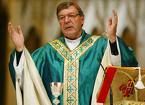 Les prochaines journées mondiales de la jeunesse (JMJ), rassemblement catholique organisé tous les deux ou trois ans, auront lieu du 15 au 20 juillet 2008 à Sydney, en Australie. L’église catholique attend 125,000 visiteurs internationaux et le pape lui-même effectuera à cette occasion sa première visite en Australie.
Les prochaines journées mondiales de la jeunesse (JMJ), rassemblement catholique organisé tous les deux ou trois ans, auront lieu du 15 au 20 juillet 2008 à Sydney, en Australie. L’église catholique attend 125,000 visiteurs internationaux et le pape lui-même effectuera à cette occasion sa première visite en Australie.
J'ai demandé à Marion Maddox, universitaire australienne spécialiste des relations églises-État et directrice du Centre for Social Inclusion à l’Université Macquarie de Sydney dans quel contexte interviennent ces journées et quel impact elles peuvent avoir sur une jeunesse australienne qui paraît a priori peu en phase avec le discours conservateur de Benoît XVI.
 L’église catholique a choisi Sydney comme lieu des prochaines Journées mondiales de la jeunesse (JMJ). A-t-elle la moindre chance de séduire les jeunes Australiens ?
L’église catholique a choisi Sydney comme lieu des prochaines Journées mondiales de la jeunesse (JMJ). A-t-elle la moindre chance de séduire les jeunes Australiens ?
J’ai du mal à comprendre ce que les JMJ essaient de faire. Elles se présentent comme un événement destiné aux jeunes, avec un accent sur la jeunesse et la modernité ; mais en même temps, c’est une célébration d’un certain traditionalisme catholique. Par exemple, le Cardinal Pell [cardinal archevêque de Sydney] a demandé que la cathédrale St Mary de Sydney soit désignée comme  un site officiel de pèlerinage, ce qui permettra à ceux qui viendront y prier pendant les JMJ d’obtenir une indulgence plénière ; des confessionnaux sont en train d’être installés dans la ville (en dépit du fait que, jusqu’aux pressions récentes de Rome pour la remise en place du confessionnal traditionnel, les Catholiques australiens ne l’utilisaient quasiment pas, préférant le « troisième rite » de la confession collective pendant la messe). Je pense que l’événement attirera des jeunes Catholiques, en particulier ceux de tendance traditionaliste, mais il semble avoir été conçu davantage pour renforcer l’identité catholique que comme une tentative pour attirer de nouveaux convertis.
un site officiel de pèlerinage, ce qui permettra à ceux qui viendront y prier pendant les JMJ d’obtenir une indulgence plénière ; des confessionnaux sont en train d’être installés dans la ville (en dépit du fait que, jusqu’aux pressions récentes de Rome pour la remise en place du confessionnal traditionnel, les Catholiques australiens ne l’utilisaient quasiment pas, préférant le « troisième rite » de la confession collective pendant la messe). Je pense que l’événement attirera des jeunes Catholiques, en particulier ceux de tendance traditionaliste, mais il semble avoir été conçu davantage pour renforcer l’identité catholique que comme une tentative pour attirer de nouveaux convertis.
L’organisation des JMJ à Sydney mobilise-t-elle l’attention des Australiens, au-delà du seul cercle des fidèles catholiques ?
Le principal impact de ces JMJ sur les Australiens non-catholiques est jusqu’ici négatif. Les journaux s’interrogent sur le montant des dépenses  engagées par le gouvernement pour l’occasion ; des routes sont bloquées et les transports publics de Sydney, déjà surchargés, seront encore plus sollicités ; on a demandé aux employés de bureau de prendre si possible une semaine de congé pour réduire les encombrements ; des lois spéciales instaurent une amende de 5000 dollars australiens pour ceux qui chercheraient à « importuner » les participants aux JMJ ; la police a dit que quiconque prendrait part à une manifestation (par exemple des groupes représentant les victimes d’abus sexuels par des prêtres) devrait au préalable soumettre pancartes et slogans pour approbation. Tout ceci nourrit les sarcasmes et l’irritation du public.
engagées par le gouvernement pour l’occasion ; des routes sont bloquées et les transports publics de Sydney, déjà surchargés, seront encore plus sollicités ; on a demandé aux employés de bureau de prendre si possible une semaine de congé pour réduire les encombrements ; des lois spéciales instaurent une amende de 5000 dollars australiens pour ceux qui chercheraient à « importuner » les participants aux JMJ ; la police a dit que quiconque prendrait part à une manifestation (par exemple des groupes représentant les victimes d’abus sexuels par des prêtres) devrait au préalable soumettre pancartes et slogans pour approbation. Tout ceci nourrit les sarcasmes et l’irritation du public.
Bien sûr, il est possible que cela change dès que le pape arrivera et que les informations négatives cèderont la place à des évènements positifs.
Quelle est aujourd’hui l’état de l’église catholique en Australie ? Le pape lui-même semble davantage se situer dans la perspective d’une reconquête du terrain perdu (la « nouvelle évangélisation ») que dans celle d’une visite en terre conquise.
 Les Catholiques australiens sont essentiellement constitués de trois vagues d’immigrants. D’abord, des bagnards et des travailleurs pauvres irlandais, suivis par le clergé et les religieux venus s’occuper d’eux ; ensuite, après la seconde guerre mondiale, des travailleurs d’Europe du Sud (des Italiens en particulier) ; et plus récemment des Catholiques du Vietnam et d’autres pays asiatiques.
Les Catholiques australiens sont essentiellement constitués de trois vagues d’immigrants. D’abord, des bagnards et des travailleurs pauvres irlandais, suivis par le clergé et les religieux venus s’occuper d’eux ; ensuite, après la seconde guerre mondiale, des travailleurs d’Europe du Sud (des Italiens en particulier) ; et plus récemment des Catholiques du Vietnam et d’autres pays asiatiques.
Le catholicisme est la plus importante confession d’Australie, avec environ 26% de la population, mais l’Australie est culturellement très sécularisée et seule une minorité de ces 26% assiste régulièrement à la messe. Alors que les chiffres de fréquentation des églises ont chuté depuis les années 1950 (dans toutes les confessions), cette période a été plus religieuse qu’habituellement ; depuis la colonisation européenne, la religion n’a joué qu’un rôle mineur dans la culture publique australienne et très peu ou pas du tout dans l’identité nationale. Donc, si le pape cherche à regagner le « terrain perdu », il devrait se demander si l’église a en réalité jamais eu un tel enracinement. Historiquement, les Catholiques ont souffert beaucoup de discriminations en Australie (par exemple à l’embauche) et étaient méprisés, considérés comme pauvres et sous-éduqués. Il y a eu un renversement au cours de la seconde partie du siècle dernier, avec un soutien généreux du gouvernement aux écoles catholiques, par exemple. Les Catholiques étaient aussi traditionnellement très proches de la gauche (le parti travailliste australien). En termes de votes, cela reste vrai, mais ce n’est plus aussi fort qu’au cours des dernières décennies. Mais même s’ils restent peu nombreux à pencher vers les conservateurs, les Catholiques sont maintenant fortement représentés au sein des partis parlementaires de droite.
L’église catholique australienne est-elle de tendance plutôt conservatrice ou libérale ?
Les deux. Ces dernières années, la tendance libérale a été prééminente, en particulier sur les questions de justice, de paix et d’environnement, les organisations catholiques ont été des voix importantes pour attirer l’attention du public sur le traitement très dur des demandeurs d’asile par le précédent gouvernement, par exemple, et ont souvent pris la défense des pauvres, des droits des travailleurs et des peuples autochtones.
Néanmoins, le plus haut responsable catholique australien, l’archevêque Geogres Pell, est généralement considéré comme conservateur, surtout sur les questions théologiques mais aussi les questions sociales. Mais les différents secteurs de l’église catholique ont des orientations politiques différentes. Les voix libérales les plus éminentes viennent des ordres religieux plutôt que de la hiérarchie d’église, par exemple.
Il faut dire aussi que même les secteurs les plus libéraux de l’église ne se distinguent pas toujours dans la défense des victimes lorsque le problème concerne l’église elle-même. On en a eu un exemple récent avec la lettre des évêques catholiques australiens condamnant unanimement un évêque retraité, Geoffrey Robinson, qui a écrit écrit un livre sur les abus sexuels dans l’église catholique.
Peut-on dire aujourd’hui que l’Australie est une société profondément sécularisée ?
Oui, près de 70% des Australiens déclarent une foi ou une affiliation religieuses, mais seulement une très petite proportion en fait une part centrale de sa vie. Environ 9% des Australiens disent aller à l’église chaque semaine.
 Dans God under Howard(1), vous décriviez les relations entre politique et religion sous le gouvernement conservateur australien dirigé jusque fin 2007 par John Howard. Le nouveau Premier ministre travailliste, Kevin Rudd, se présente quant à lui comme un fervent Chrétien, d’origine catholique, mais ne semble pas en faire un argument politique. Est-il représentatif du catholicisme australien ?
Dans God under Howard(1), vous décriviez les relations entre politique et religion sous le gouvernement conservateur australien dirigé jusque fin 2007 par John Howard. Le nouveau Premier ministre travailliste, Kevin Rudd, se présente quant à lui comme un fervent Chrétien, d’origine catholique, mais ne semble pas en faire un argument politique. Est-il représentatif du catholicisme australien ?
En fait, Kevin Rudd est anglican ; il a été élevé dans la religion catholique mais il est devenu anglican à l’âge adulte (quand je l’ai interviewé en 1999, il me disait quand même que « la possibilité de se re-convertir au catholicisme reste toujours là »). Il a beaucoup parlé de sa foi, surtout avant de devenir Premier ministre. Un de ses premiers gestes pour se construire une stature de leader a été d’écrire quelques articles de revues sur le théologien allemand luthérien Dietrich Bonhoeffer. (Je crois bien que ce doit être le premier Premier ministre australien depuis très longtemps qui puisse ne serait-ce que nommer un théologien du 20ème siècle, sans parler d’écrire un essai informé sur lui !)
Depuis son élection, sa foi transparaît dans ses déclarations, moins explicitement qu’à travers des symboles ; par exemple en février 2008, son discours d’excuse aux « générations volées » (les Aborigènes australiens enlevés à leurs familles dès l’enfance) avait très clairement un air liturgique. Les fidèles des églises mainline ont tendance à considérer la religion comme quelque chose qui peut inspirer les décisions politiques mais dont les politiciens de doivent pas faire un usage explicite. Dans l’ensemble de l’histoire politique australienne, les politiciens ont été du même avis. L’intérêt récent pour la foi personnel de nos élus reflète une américanisation de la politique australienne et une attention croissante sur les affaires personnelles des politiciens de manière générale (mariage, vie de famille, personnalité, etc…). Sachant que seule une petite proportion des électeurs va régulièrement à l’église, il faut s’intéresser aux effets plus larges de la religiosité des responsables politiques. Dans God Under Howard, je montrais que les Australiens sécularisés apprécient un certain degré de religiosité chez leurs responsables politiques. Les politiques ont la réputation d’être cyniques et intéressés ; mais quand ils insistent sur leur identité religieuse, cela nous rassure en suggérant qu’ils sont mus par des valeurs plus élevées (même si ce sont des valeurs que très peu d’électeurs partagent dans les faits).
L’Australie est un pays d’immigration. Les flux migratoires des trente dernières années ont-ils modifié le visage du christianisme australien et en particulier celui du catholicisme ? Plus largement, quelle place occupe la question religieuse dans les débats sur le multiculturalisme ?
Chaque vague de migration a apporté au catholicisme australien une nouvelle dimension ethnique. Chaque vague de migration a aussi créé un groupe facilement identifiable de nouveaux arrivants qui sont devenus la cible de peurs de types raciste ou autre. En ce moment, le grand débat sur le multiculturalisme et la religion porte sur l’islam. Il y a dix ou quinze ans, il s’agissait plutôt de savoir comment les traditions religieuses des peuples aborigènes devaient être protégées par des lois contre les activités minières ou les projets économiques sur des sites sacrés. Il y a quinze ans, le point de tension était l’antagonisme entre les Catholiques et les Protestants (même si on utilisait pas alors le mot « multiculturalisme »). La religion elle-même n’est généralement pas très importante dans ces débats ; critiquer la religion est souvent une manière de stigmatiser les autres sans faire appel à la notion de race.
1. Marion Maddox, 2005, God Under Howard. The Rise of the Religious Right in Australian Politics, Sydney, Allen & Unwin, 386 p.
Photos de Sydney : Sydney Webcam.

 during the WYD celebrations to a plenary indulgence; confessional booths are being set up around the city (despite the fact that, until recently pressured by Rome to restore the traditional confessional, Australian Catholics had scarcely used it, preferring the collective 'third rite' confession during Mass). I expect that the event will attract young Catholics, particularly those of a traditionalist mind-set, but it seems to have been designed more as an event for reinforcing Catholic identity than as an attempt to attract the unconverted.
during the WYD celebrations to a plenary indulgence; confessional booths are being set up around the city (despite the fact that, until recently pressured by Rome to restore the traditional confessional, Australian Catholics had scarcely used it, preferring the collective 'third rite' confession during Mass). I expect that the event will attract young Catholics, particularly those of a traditionalist mind-set, but it seems to have been designed more as an event for reinforcing Catholic identity than as an attempt to attract the unconverted. Le pentecôtisme est souvent qualifié de "protestantisme de l'émotion". Cette expression, essentiellement inspirée par l'effervescence des cultes pentecôtistes, conduit parfois à des analyses tronquées, tant il est vrai que la notion d'émotion renvoie à un ensemble de présupposés, de (dis)qualifications liées à des oppositions classiques comme émotion/raison, à la notion de "civilisation" telle qu'elle a été déconstruite par Norbert Elias (La civilisation des moeurs), à des rapports sociaux de domination (analysés notamment par Pierre Bourdieu dans La Distinction), des préjugés de genre (comme l'a montré l'anthropologue américaine Catherine Lutz, la femme étant bien entendu supposée prompte à l'émotion quand l'homme se doit d'incarner la raison), etc...
Le pentecôtisme est souvent qualifié de "protestantisme de l'émotion". Cette expression, essentiellement inspirée par l'effervescence des cultes pentecôtistes, conduit parfois à des analyses tronquées, tant il est vrai que la notion d'émotion renvoie à un ensemble de présupposés, de (dis)qualifications liées à des oppositions classiques comme émotion/raison, à la notion de "civilisation" telle qu'elle a été déconstruite par Norbert Elias (La civilisation des moeurs), à des rapports sociaux de domination (analysés notamment par Pierre Bourdieu dans La Distinction), des préjugés de genre (comme l'a montré l'anthropologue américaine Catherine Lutz, la femme étant bien entendu supposée prompte à l'émotion quand l'homme se doit d'incarner la raison), etc... Dans un article intitulé "Genèse des émotions au sein des Assemblées de Dieu polynésiennes", publié en 2006 dans les Archives des sciences sociales des religions, je m'efforçais de réexaminer ces présupposés, ces biais de l'analyse traditionnellement développée par les sociologues français des religions, à partir du terrain des Assemblées de Dieu de Polynésie française, auxquelles je me suis intéressé dans le cadre de
Dans un article intitulé "Genèse des émotions au sein des Assemblées de Dieu polynésiennes", publié en 2006 dans les Archives des sciences sociales des religions, je m'efforçais de réexaminer ces présupposés, ces biais de l'analyse traditionnellement développée par les sociologues français des religions, à partir du terrain des Assemblées de Dieu de Polynésie française, auxquelles je me suis intéressé dans le cadre de